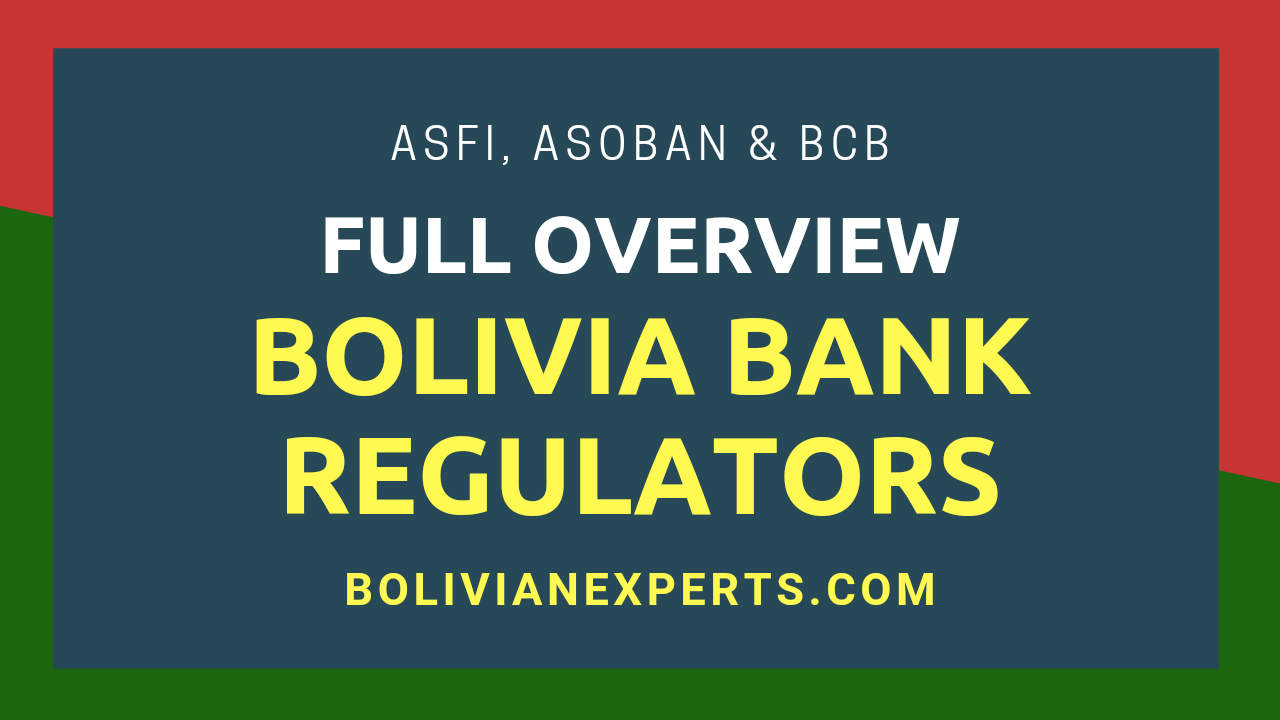The regulation of banks in Bolivia works in a very similar way as in other countries. There is 1 principal and official regulatory entity for banks, the ASFI, and also 2 other secondary regulators. These 3 entities together regulate the behavior and performance of banks by issuing policies and norms that banks must follow. There are also some laws and norms that indicate how these banks should bring services to their clients and operate.
The official main bank regulator in Bolivia is the ASFI, this government entity is in charge of ensuring that Bolivian banks bring good and fair services to their clients and work legally and effectively. The other 2 regulators are the BCB (Central Bank of Bolivia) and Asoban (Bank Association).
We are Bolivian citizens and also experts in business topics in our country, so we’ll give you all the details about the principal regulatory entities of the banking system in Bolivia and how the bank system works in the country. You’ll also learn about the principal laws and norms that control the behavior of these financial institutions.
Principal bank regulators in Bolivia
There are 3 main bank regulators in Bolivia:
- ASFI (by far the most important one)
- Asoban
- Central Bank of Bolivia BCB
1) ASFI
The ASFI is the “Financial Services Supervisor Authority” of Bolivia (Autoridad de Supervisión del Sistema Financiero), is the official regulatory institution of banks in Bolivia, and is in charge of controlling and monitoring how Bolivian banks bring their services to their clients.

This entity is a governmental institution that was created on August 21st of 2013, through the Bolivian Law No. 393 (translated) and is legally responsible for regulating public and private banks in Bolivia, ensuring that they are compliant with all the country’s laws and consumer needs when they attend clients.
This regulatory entity is responsible for:
- Ensure a high quality of banking services provided in Bolivia.
- Protect the money of their clients against possible threats and scams.
- Ensure that banks offer fair banking services and interest rates, also without any kind of discrimination.
- Ensure that banks meet the laws and policies that the Bolivian government has for them.
- Listen to bank clients and address their complaints and needs in order to improve the banking system.
- Ensure the transparency of information related to banks, their services, their fees, and interest rates, and banking information that is publicly available.
How does the ASFI work?
Every financial institution and bank that operates in Bolivia needs to be legally approved by this institution. If a financial entity is not approved by ASFI, then it’s an illegal business and its owners are liable to financial and, sometimes, criminal sanctions.
ASFI is always regulating the behavior of any bank or similar institution in Bolivia, by issuing norms and policies, doing audits, controlling the performance of the banks with banking rating systems like the CAMELS rating, attending client complaints, measuring the result of banking operations with financial studies of the market and the field, etcetera.
When a law that affects banks gets approved by the Bolivian government, it’s almost always the responsibility of ASFI to make this law operational and applicable.
2) Central Bank of Bolivia BCB
Another important regulator is the BCB. Like in most other countries with modern financial systems, there is always a central bank. For Bolivia, this is the BCB (Banco Central de Bolivia), and it is in charge of financial regulations and the financial homeostasis of the banks and their operations in the market.

This entity, regarding Bolivian banks, is responsible for:
- Making currency exchange policies.
- Determining the percentage of legal cash reserves in banks.
- Monitoring and, sometimes, controlling the active and passive interest rates of banks.
- Making monetary policies, and issuing bonds to either the general public or banks.
- Issuing national currency in cash (Bs.).
- Regulating the money transfer system of the country, either transfers between banks or client transfers.
How does the BCB Central Bank work?
This entity has its address in the downtown of La Paz, very near to the government’s central offices. It normally gets the new government financial policies and laws and applies them or makes them operational, but in a much more narrow way than the ASFI, usually addressing only monetary or very technical regulations, like the cash legal reserves, bank interest rates, issuing cash into the financial system, etcetera.
This entity also is in charge of making monetary and currency exchange policies. To address this, it has its own specialists and personnel that constantly make economic and financial studies of the Bolivian situation. Based on this information, the BCB can control and conduct these policies and regulations.
3) Asoban
Another regulator is the Asoban, which is the “Association of Private Banks of Bolivia” (Asociación Bancaria) and is like a syndicate of all major private banks in the country. The goal of this entity is to represent private banks and their interests before government regulations and other stakeholders.
This institution currently has 10 members, and these members are the largest banks that currently operate in Bolivia. It operates by representing all the banking interests and goals of its members before other institutions like the ASFI, the Central Bank of Bolivia BCB, and the Bolivian government.
It also establishes benchmarks in financial services, implements best practices, designs operational and cooperative frameworks, provides information about the field, makes recommendations, and provides services, and similar tasks, among its members.
How does Asoban work?
The Asoban works by normally making a lot of meetings with its members regularly, addressing their goals and troubles, shifting their purposes, representing their requirements upon other institutions, etcetera.
In these assemblies in which all the members need to be present, they decide as a united group how to act against or in the face of possible troubles or opportunities that the environment imposes on the bank members.
Also, this association is always looking for new best practices, better policies, better performance, and profitability in the banking operations of its private members. In summary, this association acts like a syndicate of its bank members.
The functioning of the bank system in Bolivia
The bank system in Bolivia works in the following way:
- 3 government regulatory entities
- The ASFI (regulates banks)
- The Central Bank of Bolivia BCB
- The APS (only regulates the pension system)
- There are 5 types of banks in the country
- 13 multipurpose banks
- 2 PYME banks
- 28 Cooperatives of Saving and Credit
- 7 Home Financial Entities
- 2 estatal banks
- 7 Financial Development Institutions IFDs
- 1 private bank association
- The Asoban
The multipurpose banks are general and very large banks that operate in Bolivia. They offer a wide range of services, like approving loans, making money transfers, creating checking savings accounts or fixed term deposits, issuing insurances, etcetera. These banks are the following:
- Union Bank (Banco Unión)
- Mercantil Santa Cruz Bank (Banco Mercantil Santa Cruz)
- BNB Bank (Banco Nacional de Bolivia BNB)
- Credit Bank (Banco de Crédito BCP)
- Bisa Bank (Banco Bisa)
- Fassil Bank (Banco Fassil)
- Fie Bank (Banco Fie)
- Ganadero Bank (Banco Ganadero)
- Economic Bank (Banco Económico)
- BancoSol Bank (Banco BancoSol)
- Prodem Bank (Banco Prodem)
- Fortaleza Bank (Banco Fortaleza)
- Bank of the Argentine Nation (Banco de la Nación Argentina)
We have a complete guide about the largest and principal Banks of Bolivia, with all the details about their services, their way of working, total assets and earnings, etcetera, in the following direction: The largest banks of Bolivia, a complete overview.
Another category of much smaller financial institutions that get money from the general public and give loans mostly to people, but also to businesses, are the Cooperatives of Saving and Credit, of which there are currently 28 available across Bolivia.
In the country, we also have 2 PYME banks, which are very focused on launching and supporting new businesses and small companies. There are also the 7 Housing Financial Entities, which are very targeted at giving loans to people that want to buy a house, giving them better interest rates.
Also, there are present 2 banks that belong to the government of Bolivia: the Union Bank and the Productive Development Bank, being the Union Bank one of the largest in the country. Finally, there are also institutions very focused on supporting social projects and non-profit organizations, these are the Financial Development Institutions or IFDs.
Laws and Norms that regulate banks in Bolivia
The financial services law, No. 393 Law of Bolivia
The No. 393 Law was responsible for the ASFI entity foundation, it also regulates any general aspect of the financial system of Bolivia, including the functions of the banking system, the participation of the government in this system, and the protection of the financial client, among other aspects.
The capital market law, No. 1834 Law of Bolivia
The No. 1834 Law is responsible for making the most important and general regulations about how the capital and stock Bolivian markets operate, how companies and businesses can access these markets, how banks interact with the capital market of the country, and other similar areas.
The central bank law, No. 1670 Law of Bolivia
The No. 1670 Law was in charge of the foundation of the Central Bank of Bolivia BCB. It also norms how this institution operates, which are its functions, capabilities, relationships with stakeholders, including other banks and the government, and its organizational structure, among other aspects.
The Civil Code of Bolivia
The Civil Code of Bolivia contains the main regulations for many financial operations in Bolivia, like giving loans, making contracts, fair interest rates, foreclose procedures, and similar activities, to which banks need to be subordinated in their regulations and behaviors as financial institutes.
Conclusions:
In this note about the regulators of banks in Bolivia, you’ve seen that there are 3 regulatory entities in the country: 1) the ASFI, which is the official regulator of the banking system and is controlled by the Bolivian government, 2) the Central Bank of Bolivia BCB, which is in charge of regulating monetary and very technical aspects of the banking system and 3) the Asoban, which is the association of Bolivian private banks and works like a syndicate for them.
Also, you’ve learned how the Bolivian bank system works, consisting of 13 multipurpose banks, 2 PYME banks, 28 Cooperatives of Saving and Credit, 7 Housing Financial Entities, 7 Financial Development Institutions, and 2 banks that belong to the government. Also that this system has the ASFI, the BCB, and the APS, the last one being in charge of the pension system.
Finally, you have seen that 4 main laws regulate the financial and banking system of Bolivia, the No. 393 Financial Services Law, the No. 1834 Capital Market Law, the No. 1670 Central Bank Law, and the Civil Code of Bolivia.
We hope that this information has helped you, and if you want to know more about the multipurpose Banks available in Bolivia, with all the details about their contact information, services they offer, and other aspects, visit our dedicated guide: Banks in Bolivia: A complete list and all you need to know.
BolivianExperts.com, information about how to live, work, invest, and travel in Bolivia.








